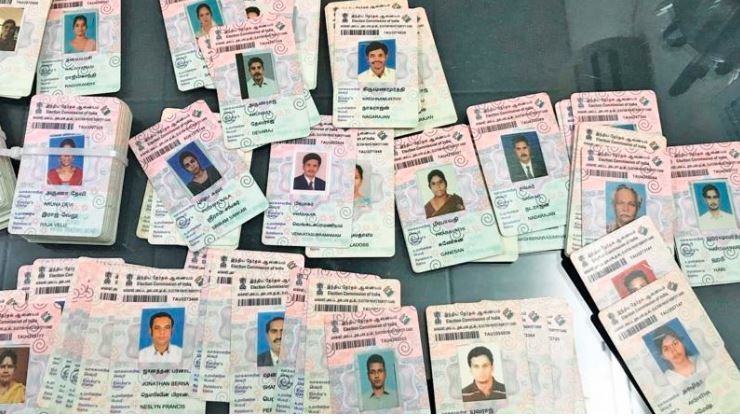BBMP revenue officials also double up as electoral registration officers. Three were suspended for issuing "BLO" cards to accused NGO Chilume.

Voter Data Theft Scam Representational Photo
Bengaluru’s civic body Bruhat Bengaluru Mahanagara Palike’s (BBMP) revenue officials, who also double up as Electoral Registration Officials (EROs), are a rattled lot.
Cornered over the voter data theft row, BBMP chief Tushar Girinath on Monday, 21 November, ordered the suspension of three officials from three constituencies.
The action came based on prima facie evidence found against them by senior BBMP officials probing how an NGO received BBMP ID cards.
The Revenue Officials/EROs of the other 25 constituencies are awaiting the BBMP’s internal report inquiring into their alleged roles in the voter data theft case.
As electoral registration officers, the BBMP’s revenue officers can be held accountable for official BBMP ID cards issued to workers employed by an NGO — Chilume — that is accused of impersonation and voter data theft.
Soon after the police served notices to around 28 revenue officials of the 28 constituencies, seeking explanations as to how the ID cards of Block Level Officers (BLOs) were issued with signatures from authorised signatories and seals to private persons belonging to Chilume, the BBMP scrambled to seek reports from all the constituencies in which they found three officials who were “brazenly” involved.
BBMP commissioner Tushar Giri Nath issued suspension orders for the three and is awaiting the reports from the other 25 constituencies, the BBMP sources said.
BBMP sources said that the show-cause notices served by the police to the concerned ROs sought their explanation on how the identity cards of BLOs were issued to private persons belonging to Chilume.
Moreover, investigations are also on to determine who were all the authorised signatories and how did they manage the seals of the authority on the IDs along with the approvals.
The revenue officials of all the other constituencies are now in a fix. If they deny knowledge of unauthorised voter data collection in their jurisdictions, it would amount to dereliction of duty. If they admit that they were in the know and had indeed issued ID cards, they are liable for action, BBMP sources pointed out.
The suspended revenue officials who also double up as EROs have been identified as Chandrashekar K from Mahadevapura, Bheemashankar VB from Chickpet, and Suhail Ahmed from Shivajinagar.
The city police maintained that so far they have arrested five people, including the prime accused Krishnappa Ravikumar, the founder and director of Chilume.
Ravikumar has been produced before the court and the police have been given his custody for 12 days for interrogation.
With these developments, the state Election Commission on Monday clarified that the state or the Central governments have no role to play when it comes to the preparation, publication, and revision of electoral rolls carried out by EROs.
“The Election Commission of India is an independent Constitutional Institution. Preparation, publication, and revision of electoral rolls are carried out by the EROs of Assembly constituencies as per the provisions of the Representation of the People Act, 1950, Registration of Electors Rules, 1960, and instructions of the Election Commission of India from time to time,” said the state-level poll panel.
“The said activities are carried out directly under the superintendence, direction, and control of the Election Commission of India. The Central government and state government do not have any role to play in the preparation or maintenance of electoral rolls and conduct of elections,” it added in its statement.
“In case of any allegation or irregularities in electoral matters, the Election Commission of India is the sole authority to probe into such allegations/irregularities. No government can order any probe in such matters,” the state Election Commission’s release stated.
With this clarification, henceforth it would be the State or Central Election Commission officials who would instruct/direct police for legal action against any allegations or irregularities.
On the allegations that minority communities were targeted and their names deleted from the electoral rolls, the state Election Commission clarified: “Electoral rolls do not contain any information related to caste or religion of voters. Hence, the question of deletion of names based on caste or community from the electoral rolls does not arise.”
It added: “Names of persons who are dead or have shifted are deleted by following due process of law. Further, the possibility of the existence of multiple names of the same person is identified using software tools by checking similarities of demographic information and photographs. Such entries are to be verified and confirmed cases of duplicate entries are to be deleted by following due process of law.”
The panel also said in its statement: “Draft electoral rolls for 2023 were published on 9 November, 2022, and notices in Form-5 have been issued by the Electoral Roll Registration Officers calling for filing of claims and objections till 8 December, 2022.”
The Congress leaders had dubbed the voter data theft scam as the “Votergate” in Karnataka, alleging that the ruling BJP and its Chief Minister Basavaraj Bommai were the kingpin of the scam.
Congress leaders also alleged that Bommai, along with the BBMP commissioner, should be made accused and arrested in the case.
Meanwhile, KPCC president DK Shivakumar will file another complaint regarding the case with the Central Election Commission in New Delhi by Wednesday evening.

Jul 27, 2024

Jul 26, 2024

Jul 26, 2024

Jul 26, 2024

Jul 26, 2024

Jul 26, 2024